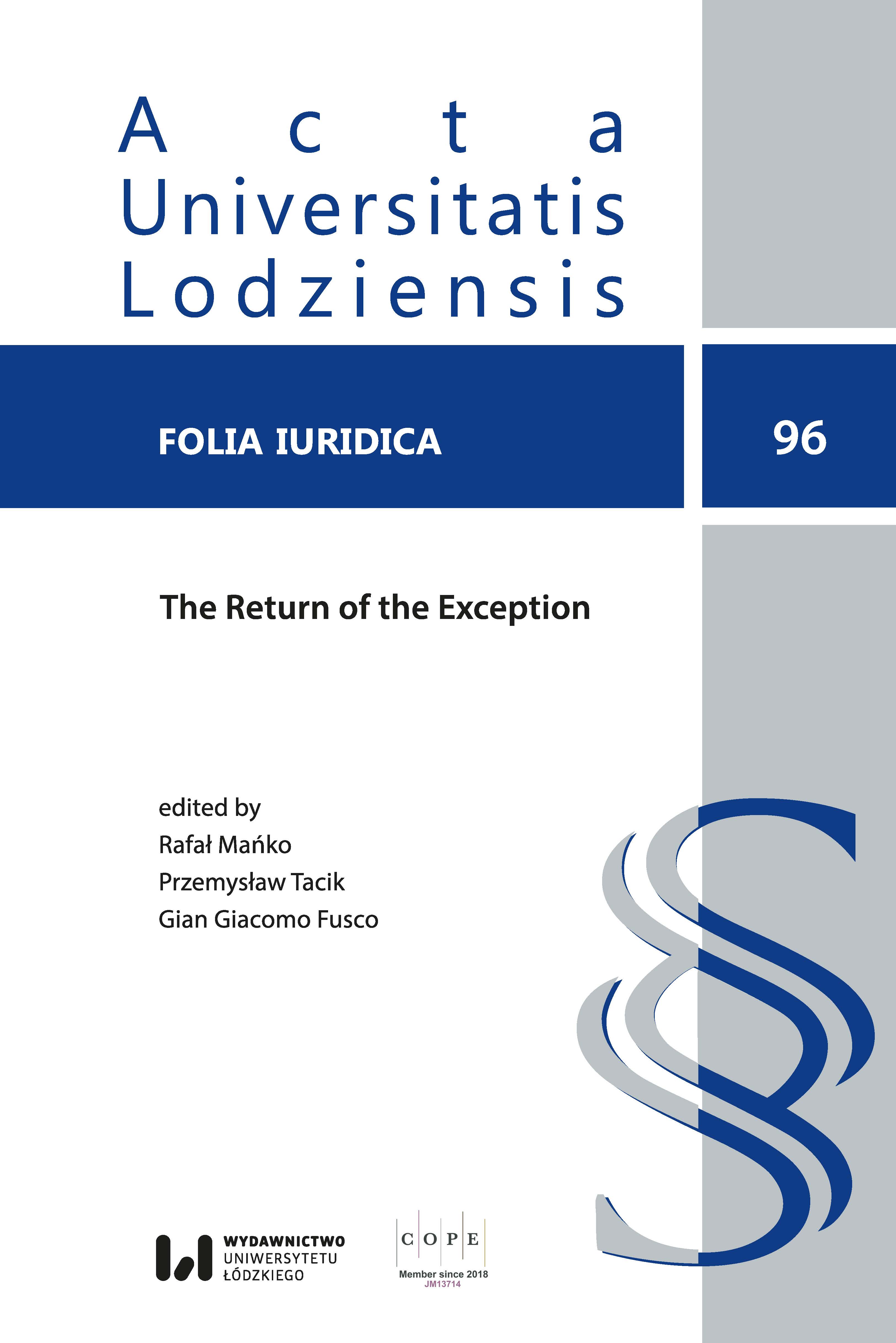Kryzys COVID-19 w Rumunii: hipoteza dotycząca populizmu penalnego i kultury prawnej
DOI:
https://doi.org/10.18778/0208-6069.96.04Słowa kluczowe:
COVID-19, Rumunia, populizm penalny, kultura prawnaAbstrakt
W niniejszym artykule staram się przedstawić hipotezę roboczą, która zostanie ostatecznie rozwinięta w przyszłym opracowaniu, a mianowicie, że kryzys COVID-19 ujawnił pewne problematyczne zachowania wskazujące na etos autorytarny zarówno po stronie władz publicznych, jak i obywateli, co sugeruje, że postawa populistyczna w dziedzinie prawa karnego może być obecnie częścią lub nawet elementem rumuńskiej kultury prawnej. W pierwszej części krótko opiszę reakcję Rumunii (przejawiającą się zarówno w podjętych oficjalnych środkach, jak i postawie obywateli) na pierwszą falę pandemii, skupiając się na roli środków karnych i wojskowych; zakwalifikuję tę reakcję jako zawierającą pewne ślady populizmu penalnego. W drugiej części zaproponuję wstępną mapę czynników, które mogą wyjaśnić tę problematyczną reakcję kulturową. Co ważne, zaliczam do nich udaną walkę z korupcją, której konsekwencją jest to, że to, co wydaje się bardzo umacniać rządy prawa w Rumunii po 1989 roku, może mieć też niezamierzony i paradoksalny skutek w postaci podważenia tegoż ideału.
Pobrania
Bibliografia
Anastasia, Stefano. Manuel Anselmi. 2018. “Penal Populism in the Multi-Populist Context of Italy.” In Multiple Populisms: Italy as Democracy’s Mirror. 164–178. Edited by Paul Blokker, Manuel Anselmi. London: Routledge. https://doi.org/10.4324/9781351115742-10
Google Scholar
DOI: https://doi.org/10.4324/9781351115742-10
Anastasia, Stefano. Manuel Anselmi. 2020. “Populist Punitiveness in the Italian Populistic Yellow-Green Government.” PArtecipazione e COnflitto 13(3): 1470–1486. https://doi:10.1285/i20356609v13i3p1469
Google Scholar
Bourdieu, Pierre. 1979. “Public Opinion Does Not Exist.” In Communication and Class Struggle 1. 124–130. Edited by Armand Mattelart, Seth Siegelaub. New York: International General.
Google Scholar
Cercel, Cosmin. 2018. Towards a Jurisprudence of State Communism. London: Routledge. https://doi.org/10.4324/9781315544113
Google Scholar
DOI: https://doi.org/10.4324/9781315544113
Cercel, Cosmin. 2021. “Law, Politics and the Military: Towards a Theory of Authoritarian Adjudication.” German Law Journal (forthcoming in October 2021).
Google Scholar
DOI: https://doi.org/10.1017/glj.2021.66
Friedman, Lawrence M. 1975. The Legal System: A Social Science Perspective. New York: Russell Sage Foundation.
Google Scholar
Grzyb, Magdalena. 2019. “Penal populism: Negotiating the feminist agenda. Evidence from Spain and Poland.” European Journal of Criminology, November 1, 2019. https://doi:10.1177/1477370819882912
Google Scholar
DOI: https://doi.org/10.1177/1477370819882912
Honig, Bonnie. 1999. “My culture Made Me Do It.” In Is Multiculturalism Bad for Women? 35–40. Edited by Susan Moller Okin. Princeton: Princeton University Press. https://doi.org/10.1515/9781400840991-005
Google Scholar
DOI: https://doi.org/10.1515/9781400840991-005
Iancu, Bogdan. 2020. “Status Quo Hegemony? Conflicting Narratives about the ‘Rule of Law’.” Verfassungsblog, October 6, 2020. https://verfassungsblog.de/status-quo-hegemony/ [Accessed: 17 June 2021]. https://doi:10.17176/20201006-124931-0
Google Scholar
Kenny, Paul. Ronald Holmes. 2020. “A New Penal Populism? Rodrigo Duterte, Public Opinion, and the War on Drugs in The Philippines.” Journal of East Asian Studies 20(2): 187–205. https://doi:10.1017/jea.2020.8
Google Scholar
DOI: https://doi.org/10.1017/jea.2020.8
Kopecký, Petr. 2003. “Civil Society, Uncivil Society and Contentious Politics in Post-Communist Europe.” In Uncivil Society? Contentious Politics in Post-Communist Europe. 1–18. Edited by Petr Kopecký, Cas Mudde. London: Routledge.
Google Scholar
Legrand, Pierre. 2011. “Siting Foreign Law: How Derrida Can Help.” Duke Journal of Comparative and International Law 21: 626–627.
Google Scholar
Mercescu, Alexandra. 2021. “Non sequiturs in Constitutional Adjudication: Populism or Epistemic Deficit?” In Populist Challenges to Constitutional Interpretation in Europe and Beyond. 194–216. Edited by Fruzsina Gárdos-Orosz, Zoltán Szente. London: Routledge. https://doi.org/10.4324/9781003148944-14
Google Scholar
DOI: https://doi.org/10.4324/9781003148944-14
Minetti, Marta. 2020. “The Facilitators Package, penal populism and the Rule of Law: Lessons from Italy.” New Journal of European Criminal Law 11: 335–350. https://doi.org/10.1177/2032284420946837
Google Scholar
DOI: https://doi.org/10.1177/2032284420946837
Nelken, David. 1996. “A Legal revolution? The judges and Tangentopoli.” In The New Italian Republic: From the Fall of the Berlin Wall to Berlusconi. 191–206. Edited by Stephen Gundle, Simon Parker. London: Routledge. https://doi.org/10.4324/9780203431443_chapter_12
Google Scholar
DOI: https://doi.org/10.4324/9780203431443_chapter_12
Pratt, John. 2007. Penal Populism. London: Routledge. https://doi.org/10.4324/9780203963678
Google Scholar
DOI: https://doi.org/10.4324/9780203963678
Pratt, John. Michelle Miao. 2017. “Penal Populism: The End of Reason.” Nova Criminis 9(13): 71–105.
Google Scholar
Roberts, Julian. Loretta Stalans. David Indermauer. Mike Hough. 2003. Penal Populism and Public Opinion. New York: Oxford University Press.
Google Scholar
Runciman, David. “Coronavirus has not suspended politics – it has revealed the nature of power.” The Guardian, March 27, 2020. https://www.theguardian.com/commentisfree/2020/mar/27/coronavirus-politics-lockdown-hobbes [Accessed: 17 June 2021].
Google Scholar
Pobrania
Opublikowane
Jak cytować
Numer
Dział
Licencja

Utwór dostępny jest na licencji Creative Commons Uznanie autorstwa – Użycie niekomercyjne – Bez utworów zależnych 4.0 Międzynarodowe.














